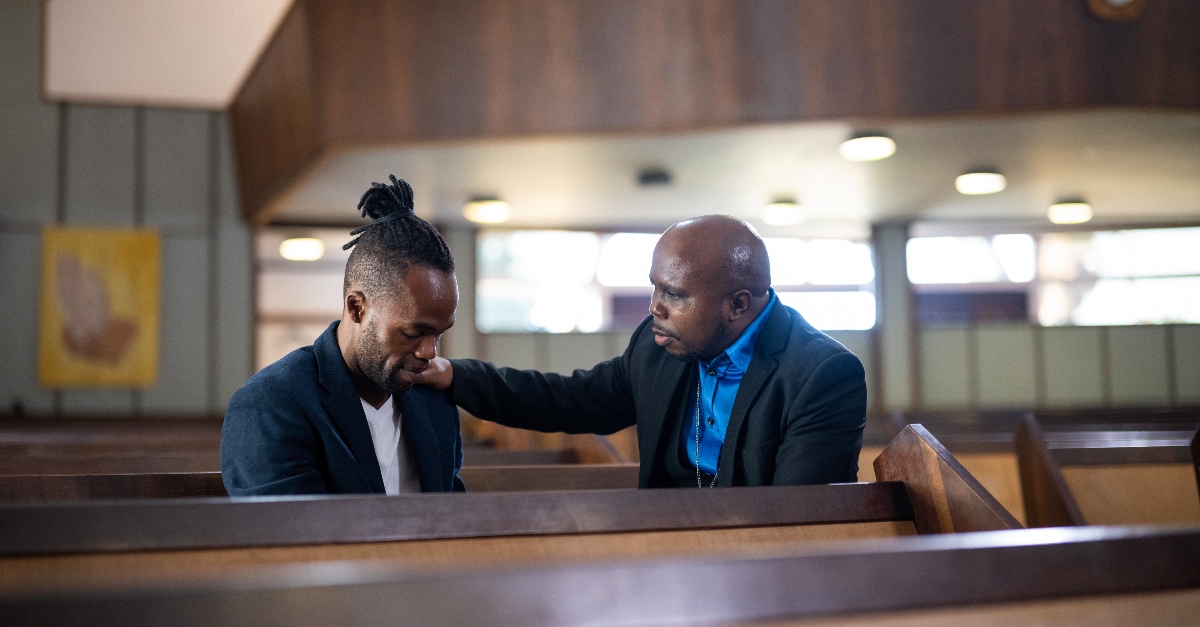How Should the Church Respond to the “Great Dechurching?”

More adults do not attend church versus those who do for the first time in modern American history. We are living during the largest and fastest religious movement in American history—but instead of adding numbers to the church, people are leaving it. Over 40 million people have left the church in the last twenty-five years. If you are shocked by these numbers, you are not alone. They are from a recent book called The Great Dechurching: Who's Leaving, Why Are They Going, and What Will It Take to Bring Them Back? by Jim Davis and Michael Graham.
I started reading The Great Dechurching after a pastor and former seminarian friend recommended it. While he is Presbyterian and the book is written from an evangelical perspective, it shares statistics across denominations. People are walking away from basically every branch of Christianity.
There is more bad news. About 70% of the people who go to church attend only 10% of the churches. Most congregations in America are small. Because the average congregation has 100 or fewer attendees weekly, they are likely to continue closing their doors due to solvency if this trend continues. Frankly put, many churches are on life support. It's a slow, painful bleed trying to stay alive.
As a pastor, the decline makes me sad; as a mother, it makes me worried. The current generation of children being raised today is the first largely unchurched in American history. Parents likely know what they are walking away from when they dechurch; they were probably raised in church and have at least a vestige of a spiritual lifeline. Children do not have that same benefit. They are unchurched at a time of alarming anxiety, depression, bullying, and suicide rates. In other words, children are without a formal spiritual lifeline, and it shows.
The Benefits

Many of us have been told that it's important to go to church. Perhaps we feel better—spiritually fed and more uplifted. But there are actual numbers to support this feeling. Researchers have discovered a link between regular worship attendance and improved mental and physical health. The Great Dechurching cites studies out of Harvard that make this conclusion. Depression, anxiety, hopelessness, and loneliness rates decrease while well-being outcomes like life satisfaction, social integration, and life purpose rates increase with service attendance. Further, frequent religious attendance was correlated with "significantly lower risk of all-cause, cardiovascular, and cancer mortality among women" (30).
It is unsurprising that drawing closer to the One who created us helps creation function more optimally. I saw this while serving as a hospital chaplain. Faith had an almost medicinal effect upon healing outcomes through its ability to support the patient holistically.
The decline in the mental health of our children is certainly a multi-factored problem; technology is undoubtedly a factor, but a lack of the stabilizing influence of the church is too. At its root, the church teaches us to ground our self-worth in God alone, not in performance or other superficial means. It also passes along instruction that is often counter-cultural but more fulfilling because it reflects the Creator's blueprint for our lives. Children cannot find what God can offer them anywhere else. None of us can.
The Need
While church numbers are declining, the need for Jesus isn't. We still need saving. We still need God's unconditional love. The better we get at filling our schedules with things other than spiritual refreshment, the more we need it. That's just how God made us. I've often noted that we are living in a time of full schedules and thin souls.
There are some encouraging facts concerning evangelicals along these lines from The Great Dechurching. First, while people have left the church, the majority still profess some degree of belief in its doctrines and would be willing to return. Their need for community would ultimately bring them back.
Sadly, the church has not met many people's need for community in recent years. The Great Dechurching cites intolerance as one driver for leaving the church. Older youth who have left the church cite their parents' inability to listen, inability to engage with other viewpoints, failure to model Christ-like behavior, and racial attitude or actions as contributing factors, for instance (9-10).
I have seen similar intolerance on the left and right side of the political spectrum, and I bet you have too. If that same division keeps people out of worship, then we have elevated politics above the name of Jesus. People who believe in Jesus can have different opinions and remain in community for the sake of his body. If the church cannot model toleration, how can we expect our government to?
Personal Experience

As a pastor, some might assume that my experience with the church has been perfect. For others who are familiar with the church's inner workings, it will not be surprising that this has not been the case. The church is a glorious reflection of the body of Jesus Christ, made up of imperfect people. I know what it feels like to feel unsupported by the people you have come to love most in Christ and dismissed without warning.
I decided to go to seminary after working as a New Yorker at a law firm during 9/11. I wanted to be part of an organization that shared my values and could publically affirm the hope we have in Jesus because I so desperately needed it myself. I have found that in the church, and I have also not found it.
We live in a time when there is a reluctance to preach the name of Jesus, not only in polite company but sometimes within the very walls of the church itself. It's also easy to cling more to political opinions in our divisive society than to Jesus, who unites us all through his body. As believers in Christ, we can't let either happen.
It's Jesus and the Holy Spirit who have kept me coming back to church, who have fed and mended my soul. God has never deserted me and is bigger than any issue that can divide us. Further, when Christ's body is working properly, the church is the deepest, richest, and most sacrificial reflection of God's glory on Earth.
Oh, the stories I could tell of church people being the hands and feet of Jesus to me! I don't want to miss that gift, and I don't want you to either. Individual spirituality, though often comfortable, simply cannot be the hands and feet of Jesus.
The Solution
Congregants. Rather than ideology shopping, allow the Holy Spirit to be your guide when finding your next place of worship. If the church is alive with the word of God, equipping people to serve, and boldly proclaiming the name of Jesus in word and deed, then allow that to be your litmus test. Reengage.
Churches. While the statistics are not encouraging, churches still have options. First, churches can think creatively. They can contemplate pivoting their programing to enhance their reach in a changing world. Second, they can merge with another church to combine resources. Third, the authors of The Great Dechurching suggest they can win even in death. This is a compelling argument that gives agency to churches even in dire straits. While their resources might not be enough to sustain them, those resources could make a real difference as a gift to a budding or already successful alternative ministry. They can still win for Jesus!
Seminaries. Seminaries must pivot their education and training, if they have not done so already. They need to prepare their graduates for a market where they might not find a job. They also need to mightily equip the graduates who do. These pastors are likely walking into congregations on financial life support. Pastors need to be financially savvy and skilled communicators with a vision. Seminary curriculum needs to include budget setting and balance sheets, social media and marketing training, and best practices for vision setting in today's charged environment. It should also include self-care for pastors, such as boundary-setting, family systems training, and Bible study. The church cannot abandon these men and women who are willing to dedicate their lives in its service.
Next Steps

Coming back to church is essential, but growing the church is, too. That's why everyone—whether a parent, grandparent, teacher, or layperson—needs to focus on the next generation. They need us, and they need Jesus. It's time to plant seeds.
Statistics say that children simply walking through the church door is not enough; they need to engage there. Youth need a leadership role—ideally, one that matches their gifting. They need to experience the thrill of God's service and the impact that they can make for God now. If adults empower youth to serve, they are more likely to return to church and meaningfully engage there down the road.
I was blessed to grow up in a vibrant Presbyterian church in the Midwest with active youth programs and Christian education. I have fond memories of youth group ski trips, summer church camp, and confirmation class. Those early roots grew into leadership opportunities as a Junior Deacon and then preacher for the Senior Sunday service. It was my first sermon—I didn't know it would be my first of many as a pastor! Interestingly, the other person selected to preach that day also became a pastor. Looking back, I don't think that was a coincidence.
Meaningfully engaging youth doesn't have to take a lot of time. One Sunday recently, I taught Sunday school with my whole family. My husband and I led while our older two boys were teen assistants for their five-year-old brother's classroom. The children were age four through entering second grade. The children waved their arms to praise songs, built Domino towers as a trust exercise, heard the Bible story about Joseph in jail, and learned why God is good, no matter what. It was such a joy to hand off parts of the lesson to my older sons and see them engage and excite the children. After we came home, my middle son asked to do it again.
Shifting the trend doesn't have to be intimidating. The Great Dechurching has other ideas, too; I wholeheartedly recommend it to anyone looking to stem the tide. Whether you read it or not, there are steps we can all take: Be aware of the shift that's happening. Reengage. Plant a seed. And hold a hand—for Jesus.
Photo credit: ©SWN/Image created using DALL.E 2024 AI technology

Originally published July 18, 2024.





